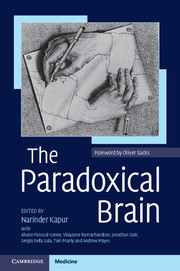Book contents
- Frontmatter
- Contents
- Acknowledgements
- Preface
- Foreword
- Author affiliations
- Abbreviations
- 1 The paradoxical nature of nature
- 2 Paradoxical effects of sensory loss
- 3 Paradoxical functional facilitation and recovery in neurological and psychiatric conditions
- 4 Paradoxes in neurorehabilitation
- 5 The paradoxical self
- 6 Paradoxical psychological functioning in early child development
- 7 Cognitive ageing: a positive perspective
- 8 Paradoxes of learning and memory
- 9 The paradox of human expertise: why experts get it wrong
- 10 Paradoxes in Parkinson's disease and other movement disorders
- 11 Paradoxical phenomena in epilepsy
- 12 Paradoxical creativity and adjustment in neurological conditions
- 13 Paradoxical functional facilitation with noninvasive brain stimulation
- 14 Unexpected benefits of allergies and cigarette smoking: two examples of paradox in neuroepidemiology
- 15 The paradox of autism: why does disability sometimes give rise to talent?
- 16 Paradoxes in creativity and psychiatric conditions
- 17 The paradox of psychosurgery to treat mental disorders
- 18 The paradox of electroconvulsive therapy
- 19 Paradoxes of comparative cognition
- 20 Paradoxical phenomena in brain plasticity
- 21 Immature neurons in the adult brain. Breaking all the rules
- 22 The paradoxical hippocampus: when forgetting helps learning
- 23 Paradoxical effects of drugs on cognitive function: the neuropsychopharmacology of the dopamine and other neurotransmitter systems
- 24 The paradoxical brain – so what?
- Index
- References
22 - The paradoxical hippocampus: when forgetting helps learning
Published online by Cambridge University Press: 05 December 2011
- Frontmatter
- Contents
- Acknowledgements
- Preface
- Foreword
- Author affiliations
- Abbreviations
- 1 The paradoxical nature of nature
- 2 Paradoxical effects of sensory loss
- 3 Paradoxical functional facilitation and recovery in neurological and psychiatric conditions
- 4 Paradoxes in neurorehabilitation
- 5 The paradoxical self
- 6 Paradoxical psychological functioning in early child development
- 7 Cognitive ageing: a positive perspective
- 8 Paradoxes of learning and memory
- 9 The paradox of human expertise: why experts get it wrong
- 10 Paradoxes in Parkinson's disease and other movement disorders
- 11 Paradoxical phenomena in epilepsy
- 12 Paradoxical creativity and adjustment in neurological conditions
- 13 Paradoxical functional facilitation with noninvasive brain stimulation
- 14 Unexpected benefits of allergies and cigarette smoking: two examples of paradox in neuroepidemiology
- 15 The paradox of autism: why does disability sometimes give rise to talent?
- 16 Paradoxes in creativity and psychiatric conditions
- 17 The paradox of psychosurgery to treat mental disorders
- 18 The paradox of electroconvulsive therapy
- 19 Paradoxes of comparative cognition
- 20 Paradoxical phenomena in brain plasticity
- 21 Immature neurons in the adult brain. Breaking all the rules
- 22 The paradoxical hippocampus: when forgetting helps learning
- 23 Paradoxical effects of drugs on cognitive function: the neuropsychopharmacology of the dopamine and other neurotransmitter systems
- 24 The paradoxical brain – so what?
- Index
- References
Summary
Summary
It is well established that the hippocampal region is critical to declarative and relational memory. Therefore, it is reasonable to expect that damage to the hippocampal region would cause impairment on any test that requires some feature of declarative/relational memory, and that on any other test, hippocampal damage is expected to have no effect. However, there have been several reports of paradoxical facilitation of learning and memory following hippocampal damage. Here, several examples in the study of animal learning and memory are discussed. In some experiments, hippocampal region damage results in the facilitation of learning simple stimulus–reward–response associations. In other experiments, the ‘flexibility’ of memory, exhibited in reversal learning and in learning multiple partially contradictory choice problems, is also facilitated following hippocampal damage. In yet other experiments, recognition based on the familiarity of stimulus combinations is improved following hippocampal damage. Each of these cases of paradoxical facilitation of learning and memory informs us about the distinctions between hippocampal-dependent memory processing and memory processes supported by other brain areas or systems. Furthermore, these findings show that competition between these systems can result in slower learning when the hippocampus is engaged, compared to when its contribution is removed.
Introduction
In the field of human memory research, our understanding of how the brain supports memory began with neuropsychological studies of patients with pervasive, ‘global’ amnesia.
- Type
- Chapter
- Information
- The Paradoxical Brain , pp. 379 - 396Publisher: Cambridge University PressPrint publication year: 2011
References
- 1
- Cited by



